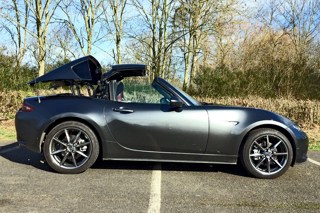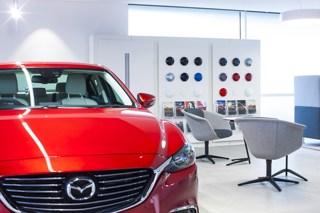Every consumer is different, and dealers’ approaches to serving them vary, but Debbie Kirlew outlines the fundamental practices to improve your customer service
Database cleansing
Capturing and checking good data is the key component of a successful customer relationship management (CRM) strategy, but with email capture forming part of manufacturer standards, it can become a ‘tick box’ exercise, according to Chris Poulsom, CRM director, MDF Database Solutions, while multiple systems mean many dealers often do not have a single customer view.
Incorrect data leads to poor customer service, said Poulsom: “If the MOT due date is wrong, we will send reminders at the wrong time, which can lead to loss of trust.
“It’s all about the processes. If a customer does not want to receive marketing, what’s the process? What systems are in place when a customer opts out of email? What do you do if an email bounces, what about the right to be forgotten?”
Dealers often waste money on cleansing data – Poulsom advises businesses to archive customers who have not been in contact for the past four years.
A recent analysis of a sample of 50,000 vehicle visits to franchised dealer workshops by Marketing Delivery found 32% of customer records lacked at least one crucial piece of data, including one group missing a servicing due date for more than a quarter of its records.
However, improving data quality can deliver results. Email open rates for one Marketing Delivery client regularly exceeded 60%, compared with the typical rate of 20%. The same client also increased service and MOT bookings by 26.8% in 2016 compared with 2015, with a corresponding boost in retail hours invoiced, while vehicle sales at a VIP sales event increased by 30% year-on-year.

Recruit well
Nathan Tomlinson, dealer principal, Devonshire Motors, and the winner of the 2016 AM Award for best customer service, said: “Finding the right people – and then retaining them – is the cornerstone to success in all areas of the business. You have to be prepared to challenge conventional wage and commission structures at the planning stage. Staff recruitment and retention is as much about the culture and reputation you have created as it is about the remuneration.”
Deborah Reeves, director of customer services at Jardine Motors Group, the winner of the 2017 AM Award for customer care, said: “Recruiting the right staff is where great customer service begins. For us, identifying people who are empathic is our top priority. We are always looking for those who show passion, leadership, good judgement and integrity and take ownership of situations and challenges.”
Guy Liddall, managing director of recruitment agency Motor Trade Selection, said: “While the biggest influence on staff turnover and engagement is strong, effective management, the second is good recruitment. The best recruiters are always prepared, and never have to hurry a recruitment process. The worst recruiters leave things too late, recruit in a hurry and continue to make many avoidable mistakes. It still surprises us how many employers fail to take out proper references and to check basic details of past employment history.”

Answering calls and emails
Speed of response to calls and emails can determine whether a customer opts for one business over another.
Jo McKeown, automotive business development manager at outsourced switchboard company Moneypenny, said: “One of the biggest improvements a dealership can make to its customer service is to make sure the phone is answered every time it rings.
“An unanswered call can mean lost business – a new car or service enquiry gone elsewhere. Dealerships must understand that although they cannot see the other person on the end of the phone, they are just as important as the customer on the forecourt.”
Dom Threlfall, managing director at Hyundai and Suzuki dealership Pebley Beach, links the telephone system with the DMS so a customer’s details appear on screen automatically when a call is received, resulting in a more personal experience with all information to hand.
 Personal experience
Personal experience
At Pebley Beach, automatic number plate recognition (ANPR)cameras recognise the vehicle’s registration enabling customers to be welcomed personally to the business. The customer is then escorted everywhere by a member of staff.
Using a system adopted from Domino’s Pizza that enables every stage of an order to be tracked, Pebley Beach allows customers to follow their car’s progress through the workshop via a link.
Introduced eight years ago, only about 10% of customers use it, but Threlfall thinks as more millennials become customers, it will become much more widely used.
“Wherever I go if there’s something I like, I try to replicate it in the business. For example, the way in which waiters add a smiley face or something personal to the bill. It’s these ‘one percenters’ that add up to a great customer experience,” said Threlfall.
Tomlinson added: “While I agree that there is a place for technology in this area, you can’t beat personal attention. There’s a huge difference between getting to know your customers – as a result of their loyalty and your staff retention – and a system that alerts you to a customer’s arrival by prompting you with their name and how they take their coffee.”
Reeves said: “To make the experience truly personal, we make sure that we know what each individual customer likes. The finishing details really matter.”

Collection and delivery drivers
As the only member of staff some customers see, the full responsibility of how a business is perceived can rest solely with collection and delivery drivers.
“We view our collection and delivery drivers as vital, as often they are the only face of the dealership that the customer sees,” said Peter Smyth, director at Swansway Group. “Our drivers are usually older and have often held senior jobs in the past, including ex-police officers. They understand the value of customer service and because they treat customers so well, these customers are much more likely to remain loyal to the business.”

Customer-facing staff
Dealers are increasingly looking at creating different roles and reconfiguring the traditional sales model as they strive to achieve greater levels of customer service. At Rockar, the boutique-style retail outlet at Bluewater and Westfield shopping centres, ‘angels’ have replaced traditional sales executives.
Founder and chief executive Simon Dixon said: “We recruit on personality first, communication skills and ability to retain knowledge. There is no sales training as our concept is not to sell to the customer, but to give them all the information they need to make the right purchase for them.”
Pebley Beach is introducing promoter and transactor roles to its sales team. Promoters provide customers with information and are paid a flat salary and can choose their own hours, while transactors are paid a commission and are more similar to the traditional sales executive.
Threlfall said: “The industry is in a state of flux. More and more cars are being sold with a flat fee instead of a margin. We need to change the way cars are being sold – the customer is now in control.”
Focusing on customer care has helped to fuel volume sales growth at single-site Mitsubishi dealer Devonshire Motors – from 356 new and used units in 2011 to a projected 550 this year. Devonshire introduced showroom hosts who are not assigned to any one department and work primarily for the customer.
In Swansway’s Volkswagen and Audi dealerships, the hosts are also recognised as influential. Smyth said: “When we receive letters complimenting us on our customer service, they invariably mention the hosts. It can still be quite daunting for people coming into the dealership and having a friendly face who welcomes you before you even step into the premises can make all the difference.”
Swansway is in its second year of recruiting trainee salespeople through a scheme that attracts graduates and people from different backgrounds, but who are not experienced in automotive sales. The group employed 12 last year, of which 10 remain. Recruitment for a further 20 is about to begin. The six-month training scheme offers an initial salary of £24,000 while the recruit is trained in all aspects of sales with an emphasis on customer care. It then reverts to a basic-plus-commission pay structure.
Commented Smyth: “The recruits have seen the earning potential and are confident about what they are doing, but because we have focused on customer care this remains at the heart of the service they deliver.”

Meet the customers’ needs
Modern dealerships invariably offer internet access and endless cups of coffee. Some, like Pebley Beach, offer cake, and at Devonshire Motors, hot drinks range from green tea to Mars-flavoured cappuccino.
Tomlinson said: “Forget ‘waiting area’, think ‘coffee shop’. If you can put a customer into the right environment, it no longer becomes a case of ‘waiting’.”
At Swansway’s six Audi sites its breakfast initiative, introduced about a year ago, has gained in popularity as well as saving the aftersales department time and money on collection and delivery or courtesy cars. Service customers order a complimentary breakfast as part of its ‘while-you-wait’ option with around 20 service and breakfast bookings made each week.
Threlfall said: “We always play the music too loud, I learned that from the Disney University. If the music is in the background, you can’t quite make it out, but if it’s louder, you can hear it. It makes the showroom feel more alive.”
The biggest issue for most customers is parking, so at Pebley Beach a reserved parking area enables customers to park quickly and easily. Their car is then moved, freeing up the reserved parking for the next customer.



















Anastasia - 12/04/2017 08:52
You are so right in every item here, thanks. We are also very careful with recruiting staff for customer support services, who never stop grow professionally (https://mobilunity.com/customer-support/). There might be only one more thing added here, and that is proper website development as well, where some specific plugins and widgets simplify the work of every consumer and customer support agent. For example shipping cost calculator (for eShops), which already gives some answers to people. Especially specific widgets concern automotive business. need customer support customer support agent outsource customer service customer support services